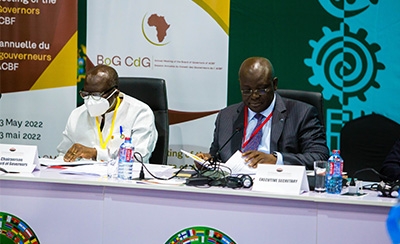
… It’s time to cross the bridge from policy-making to implementation, says Chair of Executive Board
Africa must takethe upheaval of the past two years of the Covid-19 pandemic as an incentive to turn its rhetoric about integration into concrete steps. It is time to cross the bridge from policymaking to implementation, saidH.E. Erastus J. O. Mwencha, Chair of the Executive Board of ACBF, at the Foundation’s 31st Board of Governors Meeting held on the sidelines of the African Development Bank Annual Meetings which opened in the Ghanaian capital, Accra, on 23 May.
According to H.E. Mwencha, Covid-19 brought new challenges that nobody had ever imagined. It also brought home some hard truths. “Some of these truths”, he said, “relate to the urgent need to build African economies that are more resilient to external shocks, and an Africa that can stand on its own.”
Worse, he said, just as the world was beginning to get a bit of respite from the Covid-19 pandemic, the war between Russia and Ukraine brought further disruptions to African economies, underscoring even further, the need for the continent to build strong and resilient economies.
“The African Union’s Agenda 2063 lays out a long-term plan for the Africa we want to see in the future,” the Chair of the ACBF Executive Board said. “What we have experienced over the past two years should convince us to accelerate our steps in meeting one of the African Union’s key aspirations, which is to build an Africa capable of achieving its own development. The scale of disruption we have seen should compel us to closely look at how our economies are structured, and how they relate to each other.
“We must take the upheaval of the past two years as an incentive to turn our rhetoric about integration into concrete steps. It is time to cross the bridge from policy-making to implementation,” H.E. Mwencha added.
He said ACBF is ready to partner with all its member states as they develop the capacity needed to build more resilient economies.
Sharing ACBF’s experiences of the past few years, H.E. Mwencha said the Foundation had rebounded well from the turbulence of Covid-19. Its strategy to recover was anchored on resilience, internal reforms and increasing efficiencies. This strategy included optimizing its human resource management capabilities as well as transitioning to automated and more efficient business processes.
“You will be encouraged to know that because of our internal reforms, your funds and those from our partners are being managed even more efficiently, as we continue to improve on the efficiency ratios,” the Chair of the Executive Board told the assembled governors and those attending via Zoom.
“For instance,” he said, “the cost-to-disbursement ratio has fallen from 25.1% in 2020 to 16.2% in 2021. I am also pleased to report that ACBF achieved a clean audit status again in 2021.”
Continuing, H. E. Mwencha disclosed that, “even as programing was disrupted by the Covid-19 pandemic, we pivoted to virtual supervision of projects, by utilizing our ICT capabilities. We delivered, while cutting costs. With a more efficient Foundation, we are in a much better position than at any other time, to work with you as you lead your economies through recovery and towards sustainable growth.”
He said Africa was standing at the starting line of an exciting journey, which is to build potentially the largest and most diverse trading area in the world, the Africa Continental Free Trade Area (AfCFTA). Making the AfCFTA a success, he said, was one of the key priorities of ACBF.
“Human and institutional capacity will be key building blocks for the AfCFTA’s success,” the Chair of the Executive Board explained. “Therefore, ACBF has rolled out specially designed programs to prepare economies around the continent for the challenges and opportunities ahead.”





